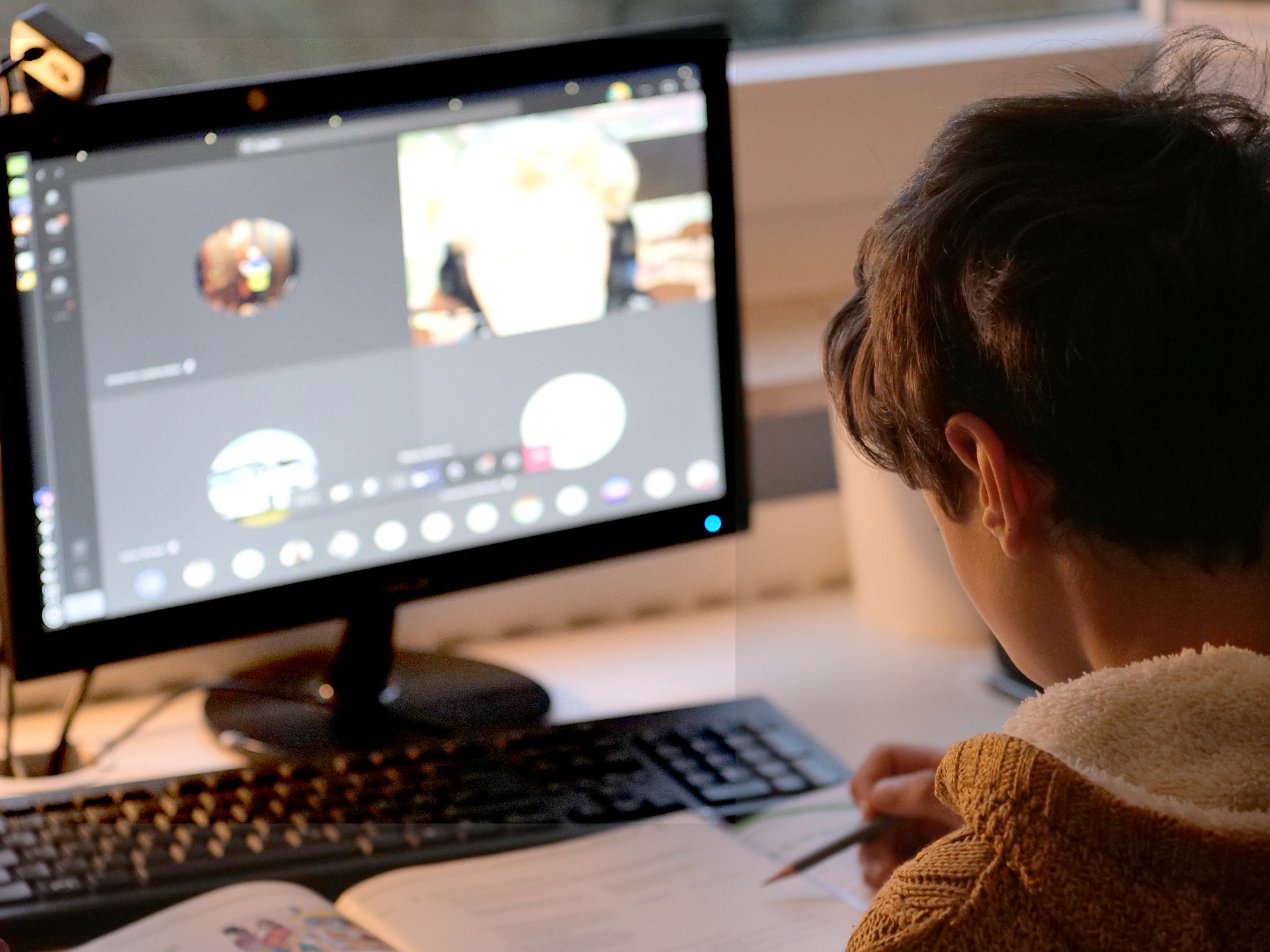
- Home
- India
- World
- Premium
- THE FEDERAL SPECIAL
- Analysis
- States
- Perspective
- Videos
- Sports
- Education
- Entertainment
- Elections
- Features
- Health
- Business
- Series
- Bishnoi's Men
- NEET TANGLE
- Economy Series
- Earth Day
- Kashmir’s Frozen Turbulence
- India@75
- The legend of Ramjanmabhoomi
- Liberalisation@30
- How to tame a dragon
- Celebrating biodiversity
- Farm Matters
- 50 days of solitude
- Bringing Migrants Home
- Budget 2020
- Jharkhand Votes
- The Federal Investigates
- The Federal Impact
- Vanishing Sand
- Gandhi @ 150
- Andhra Today
- Field report
- Operation Gulmarg
- Pandemic @1 Mn in India
- The Federal Year-End
- The Zero Year
- Science
- Brand studio
- Newsletter
- Elections 2024
- Events
- Home
- IndiaIndia
- World
- Analysis
- StatesStates
- PerspectivePerspective
- VideosVideos
- Sports
- Education
- Entertainment
- ElectionsElections
- Features
- Health
- BusinessBusiness
- Premium
- Loading...
Premium - Events

When virtual takes the meaning out of learning, and life
Today's generation of online learners acquire knowledge limitlessly but with neither the skill, the experience nor the social benefits befitting their chosen specialty.

Nithin, 23, was finishing up the second semester of M.Com in an MG University-affiliated college in Kottayam, Kerala when the pandemic struck. His last year of college was spent entirely online. Five hours of back-to-back digital classes followed by umpteen assignments. Scores of video uploads to watch before the next class, webinars that warranted compulsory attendance. “Online...
Nithin, 23, was finishing up the second semester of M.Com in an MG University-affiliated college in Kottayam, Kerala when the pandemic struck. His last year of college was spent entirely online. Five hours of back-to-back digital classes followed by umpteen assignments. Scores of video uploads to watch before the next class, webinars that warranted compulsory attendance.
“Online classes actually meant being logged-in all the time. No college tour, no internship, not even a farewell ceremony. This was the most depressing year of my student life!”
Remya, 20, is a final year B.Sc Botany student who has applied for the post of a probationary clerk in a nationalised bank. “From Botany to banking, I know it doesn’t make sense. But anything is better than two more years of virtual classroom. Last year was a struggle. Learning was average, most of us had internet issues. The biggest disappointment was my final project–we had to choose non-laboratory topics that could be done at home. All of us ended up researching indoor plants on Google!”
Jyothi, 20, from Kochi just completed her last semester in BA Literature and is awaiting her university exam results. “Our teachers tried their best. We couldn’t visit the library but they gave us plenty of YouTube links and videos, they organised debates and grouped us to present critical analysis in class. They asked us to sign up for alternate online capsule courses to improve our language skills and overall confidence.”
But Jyothi, again, has just sat for an online bank interview. “My post-graduation can wait. Or I’ll do both simultaneously. But I’m not going to spend the next two years of my life doing nothing.”
Welcome to the world of today’s undergraduate—isolated, bored and passion-less, acquiring knowledge limitlessly but with neither the skill, the experience nor the social benefits befitting their chosen specialty. Almost everyone, irrespective of their main stream, is sitting for the first job interview coming their way through online campus recruitment. Almost always, it is a bank.
“We all assumed that a high-speed internet connection, digital skills and a little bit of pedagogic adjustment would ensure a smooth transition to virtual classrooms,” says Rishikesh BS, Associate Professor at Azim Premji Foundation, Bangalore. “We couldn’t have been more wrong.”
If the value of education imparted in schools in the pandemic year is rated a minus 5, then at the higher education level, it can be a mere one percent, that’s all.
“Education is much more than a one-way communication of running through the portions. Teachers need to engage, collaborate and interact. After all, what is the point of education if it doesn’t lead to solution-finding, community bonding or simply an overall development of the individual and the society as a whole?”
Advantages and disadvantages
The online experience, unfortunately, does not create a space for any of these. “Higher education is all about generating knowledge, experiential learning, skills,” says Rishikesh, but virtual classrooms can make college education seem like another phase of knowledge acquisition.
For second year M.Com student Amitha, it took one whole semester to adapt completely to online classes. Hailing from an economically-backward family in the High Ranges, she had internet issues throughout the year.

“Live classes took a lot of Internet speed. So, most of my learning was by watching the videos created by our faculty. Even during a live class, almost everyone kept their cameras off to save internet. Our class strength was only 20 but hardly any one spoke up or interacted with the teachers even though we were not freshers.”
Says Arun, a final year B.Com student, “Although we had two years of normal college life before the pandemic struck, the last year took a toll on all of us. Apart from the usual Net issues, there was a profound sense of loss. We missed out on our IV (Industrial Visit) and the one-month internship with a bank.”
The only advantage, he says, was that the University changed the way it graded the semester test papers. “We were given more options. For example, previously if we had to answer 10 questions of 5 marks each compulsorily, now we are required to respond to only six carrying two marks each. The idea is to make it easier for the student to score more marks.”
“Nothing can replace physical classrooms,” says Anu P Mathew, assistant professor of commerce in a university-affiliated college in Central Kerala. “Dissemination of knowledge has been done, but how much of it was grasped? Two-way communication was next to impossible. Students, especially from Idukki and Wayanad districts, had to step out of their houses to get connectivity. Live classes are far more effective because it ensures participation. But technical problems abounded with that. We had to resort to creating all sorts of videos–some with a PPT going on simultaneously, some with only images and a voice-over. Some of us also took videos with the black board in the background, just so that we could give the students a feel of being in a classroom.”
Learning never stops
Everyone apparently has tried their best to make the new normal work. But in the post-pandemic era, how can an under-graduate get the maximum benefit out of the only alternative available to him?
“Blended learning,” says Rishikesh, “is the future.” Since online education is limitless, an undergraduate can have the best of both worlds. Apart from earning his degree through the college of his choice through virtual classrooms, he can also avail of the umpteen number of online courses offered by universities and corporates, here and abroad.
“Add-on skills and courses will definitely give him the extra edge, which means that even in the event of getting back to a campus life, the online experience of knowledge acquisition can continue.”
As with Arun. He did 55 courses in various subjects through the Massive Online Open Course (MOOC) site. Thirty-two of them were certified by Google. All were free.
“They provide you the study materials, videos with subscript and conduct periodical tests and a final examination.” Before the pandemic, these same courses were available but were expensive and of a longer duration. “Today, they are free and available in a capsule version. Thanks to Corona, I’ve saved almost Rs 1,20,000 in course fees!”

Jeet, hailing from Kannur, is another resourceful first-year B.Com student who gave tuitions to school students in his neighbourhood. He became part of a social collective for relief work during the pandemic. On the site Internshala, he applied to many courses that even offered certification. “I enrolled for IELTS classes last semester. This semester, I’m working as a data entry operator for a Kochi-based company. I’m also planning to enrol for a language course.”
Ammu and Aleeta, both freshers from Idukki during the pandemic year, got two weeks of campus life last February once the Covid-related restrictions were lifted in Kerala. “That hardly counted for anything because our class was divided into two groups, each could attend on alternate days. Canteens were closed, no grouping was allowed inside the campus, even the seating inside the classrooms was different.” Benches were replaced by chairs spaced far apart. “But somehow, meeting our classmates and teachers for the first time broke the ice. And although we had to return to online classes soon again, we were a little more uninhibited in class.”
Ammu tried a few online courses through Coursera although she couldn’t complete any. She earned a little by taking tuitions for schoolchildren and also typing academic work in Malayalam for post-graduate students. She is planning to take both two-wheeler and four-wheeler licences this year.
What matters for employers
“When we look at fresh graduates for recruitment, his degree of specialty hardly matters,” says the executive director of one of the leading private banks in the country. The fact that the applicant is from the ‘Corona’ batch also doesn’t place him at a disadvantage. “In banking especially, assessment programs do not lose its efficacy by going online. Group discussions, for instance, had to be eliminated but new screening processes have emerged under the new normal.”
The fact is, banks have been able to cut down significantly on their recruiting expenses by going completely online. “Also, online educational space has grown exponentially and the perfect candidate is the one who has upscaled himself, irrespective of having attended his classes inside the campus or facing a screen.”
Most of Kerala’s university-affiliated colleges have children hailing from lower socio-economic backgrounds. From daily-wage labourers to small-time farmers, their parents have come under severe financial strain the past year. The digitalisation-divide between the have and the have-nots is not that narrow, the topography of the state doesn’t help in resolving the issues of internet connectivity either.

“On a scale of one to five, parents who agreed to suffering financial stress this last year was almost four,” says Anu, who recently won the KM Mani Centre for Budget Research award for her project ‘The Financial Well-being of the Toiling Masses’. She interviewed 110 respondents, who were the parents of her students, across the State. “While they agreed to being able to maintain their purchasing power, manage their resources and support the quality of life despite the pandemic, majority of them could not save money or plan a sound financial future.”
A sound and speedy wi-fi connection cost these children anywhere between Rs 4000 to Rs 6000, every six months.
In any case, the honeymoon phase of the virtual classroom experience is over. This year, the teachers are digitally smarter and vigilant; the students, hopefully, honest and resourceful.
“Ideally, the UNICEF should have declared a zero-academic year. Because, let’s face it, nothing conclusive has taken place”, says Rishikesh, also a committee member for the National Education Policy (NEP) implementation plan for Karnataka.
The undergraduate has lost many irredeemable experiences, but online education is limitless. Facing his first interview panel, the student who took maximum advantage of the global virtual learning space will display his passion. And that’s all it takes, corona-batch or otherwise.
